|
|
Culture of Empathy
Builder:
Martin Hoffman
Pending - in development
|
|
|
|
|
"My
long-term interest is social and emotional development, especially empathy,
moral development, and the relation between the two. Included are certain
affects/motives that result from the interaction of empathy, causal
attribution and situational contexts: sympathy, guilt, empathic anger and
feelings of injustice. Also empathy's role in clinical contexts: impact on
treatment; vicarious traumatization in therapists; empathetic processes in
depression. Of equal interest are the interaction of empathy and abstract
moral principles such as justice; and the processes of interaction between
affect and cognition in general." |
Links
Empathy and Moral Development: Implications for Caring and Justice
By John C. Gibbs and Martin L. Hoffman |
 |
|
"Contemporary theories have generally focused on either the behavioral,
cognitive or emotional dimensions of prosocial moral development. This
volume provides the first comprehensive account of prosocial moral
development in children. The book's focus is empathy's contribution to
altruism and compassion for others in physical, psychological, or economic
distress; feelings of guilt over harming someone; feelings of anger at
others who do harm; feelings of injustice when others do not receive their
due. Also highlighted are the psychological processes involved in
empathy's interaction with certain parental behaviors that foster moral
internalization in children and the psychological processes involved in
empathy's relation to abstract moral principles." |
Hillary has a point: In defense of empathy and justice
By John C. Gibbs and Martin L. Hoffman
"Yale psychologist Paul Bloom objected that we can’t actually do that
(at least not as well as we think we can), especially when our neighbor
is someone in a quite different situation or condition—say, a
stressed-out single parent, a traumatically scarred war veteran, or an
autistic child. Besides, declared Bloom, even if we could fully and
accurately feel and see from another’s perspective, empathy is often too
narrow and parochial to serve as a moral guide. Far less limited, Bloom
asserts, is reason: specifically, the impartial principles and
procedures of justice. We should “step back” from empathy and “apply an
objective and fair morality,” a “dispassionate analysis” of distressing
situations. Bloom has even declared that “empathy will have to yield to
reason if humanity is to survive.” "
Notes
[They
say
students become overwhelmed and withdrew.
This is
not a problem with empathy but with overwhelm and withdrawal.
A problem with students not being able to stay present with empathy.]
Selected
Publications
Hoffman, M.L. (In Press). How automatic and representational is empathy
and why? Brain and Behavioral Sciences.
"The claim that empathy is both automatic and
representational is criticized as follows:
-
(a) five empathy-arousing processes ranging from conditioning and
mimicry to prospective-taking show that empathy can be either
automatic or representational, and only under certain circumstances,
both;
-
(b) although automaticity decreases, empathy increases with age and
cognitive development;
-
(c)
observers' causal attributions can shift rapidly and produce more
complex empathic responses than the theory allows. "
Hoffman, M.L. (2001). A comprehensive theory of prosocial moral
development. D. Stipek & A. Bohart (EDs.), Constructive and destructive
behavior. (pp. 61-86). Washington, D.C.: American Psychological
Association.
Hoffman, M.L. (2000). Empathy and moral development: Implications for
caring and justice. New York: Cambridge University Press. (This book has
been translated into Chinese, Japanese, Spanish and Serbian.)
Hoffman, M.L. (1997). Varieties of empathy-based guilt. In J. Bybee
(Ed.), Guilt in children (pp.91-112). New York: Academic Press.
Hoffman, M.L. (1990). Empathy and justice motivation. Motivation and
Emotion, 4, 151-172.
Hoffman, M.L. (1987). The contribution of empathy to justice and moral
judgment. In N. Eisenberg and J. Strayer (Eds.), Empathy and its
development (pp. 47-80). New York: Cambridge University Press.
Hoffman, M.L. (1985). Affect, motivation, and cognition. In E.T. Higgins
& R.M. Sorrentino (Eds.), Handbook of Motivation and Cognition:
Foundations of Social Behavior. NY: Guilford, 244-280.
Hoffman, M.L. (1983). Affective and cognitive processes in moral
internalization: An information processing approach. In E.T. Higgins, D.
Ruble, & W. Hartup (Eds.), Social Cognition and Social Development: A
Socio-Cultural Perspective. New York: Cambridge University Press,
236-274.
Hoffman, M.L. (1982). Development of prosocial motivation: Empathy and
guilt. In N. Eisenberg-Berg, (Ed.), Development of Prosocial Behavior.
New York: Academic Press, 281-313.
|






